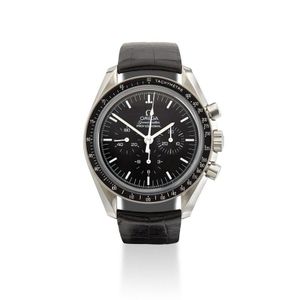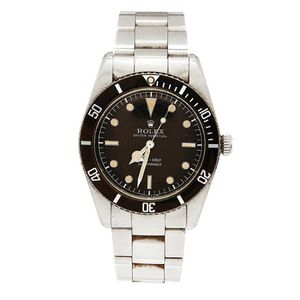Omega Speedmaster Apollo 11 40th Anniversary Watch
You must be a subscriber, and be logged in to view price and dealer details.
Subscribe Now to view actual auction price for this item
When you subscribe, you have the option of setting the currency in which to display prices to $Au, $US, $NZ or Stg.
- Moon Dial - If we imagine life in the 17th century, the only source of ascertaining the time of day or night would have been the local church or municipal clock striking every quarter hour, and able to be heard by all in the village. In England, when longcase clocks became popular and more affordable in the late 17th century, the function of timekeeping and source of time was moved to within the home.
An additional feature on some longcase clocks was to display the phases of the moon, that is the new moon, the full moon and the waning moon over the lunar 29 ½ day cycle. This information was important for farmers for working out cropping schedules; for travellers to know the amount of moonlight on a night they planned to travel; and for those who lived near the sea required knowledge of the tides.
Where included, the moon dial is usually in the form of a disc incorporated into the main dial plate, usually in the arched top section. The lunar cycle starts with the new moon displaying, which is a dark night sky and no man-in-the-moon face being displayed, and then progresses to the full moon face showing on the 15th day of the lunar cycle, and back to no face displaying as the moon wanes. Most lunar dials are partially concealed on each side of their opening in the main dial plate by semi-circular "humps" that allow the painted face to emerge slowly just as the real moon goes out of and back into the earth's shadow.
Nowadays, details of the lunar cycle is published in diaries, almanacs, and newspapers and although some modern longcase clocks are still manufactured with working moon dials, they are more for decoration than for use. - Apollo - Apollo is the Greek and Roman god of the sun, and patron of music and poetry. He is often depicted with a lyre.
- Chronograph - A chronograph is a watch that also incorporates the features of a stopwatch, to measure elapsed time. Most chronographs are operated by two buttons, one to start and stop the chronograph second hand, and the other to return that hand to the starting position.
- Movement - The technical name for the workings of a clock or watch, and does not include the dial or case.
- Circa - A Latin term meaning 'about', often used in the antique trade to give an approximate date for the piece, usually considered to be five years on either side of the circa year. Thus, circa 1900 means the piece was made about 1900, probably between 1895 and 1905. The expression is sometimes abbreviated to c.1900.
This item has been included into following indexes:
Visually similar items

Omega, a stainless steel chronograph wristwatch with registers mvt 77175131 Speedmaster, manual winding movement, fully jewelled, black dial, luminescent baton indexes, three subsidiary dials for constant seconds, 30-minute and 12 hour registers, stainless

An Omega Speedmaster Pro mark II, c.1975 wristwatch, good dial 17 jewel manual wind movement.

A rare early steel Rolex Oyster Perpetual Submariner (no Crown Guards), 1958-9, model 5508 ('James Bond'). Calibre 1530 automatic movement 25 jewels, SN 04818. Case number 399687. White dial (later Rolex bracelet).

A Tag Heuer Aquaracer chronograph wristwatch, quartz movement, circular black dial with illuminated baton numerals and Arabic numeral at twelve, date aperture between four and five, sweep seconds hand, signed case, dial and movement, stainless steel case w
